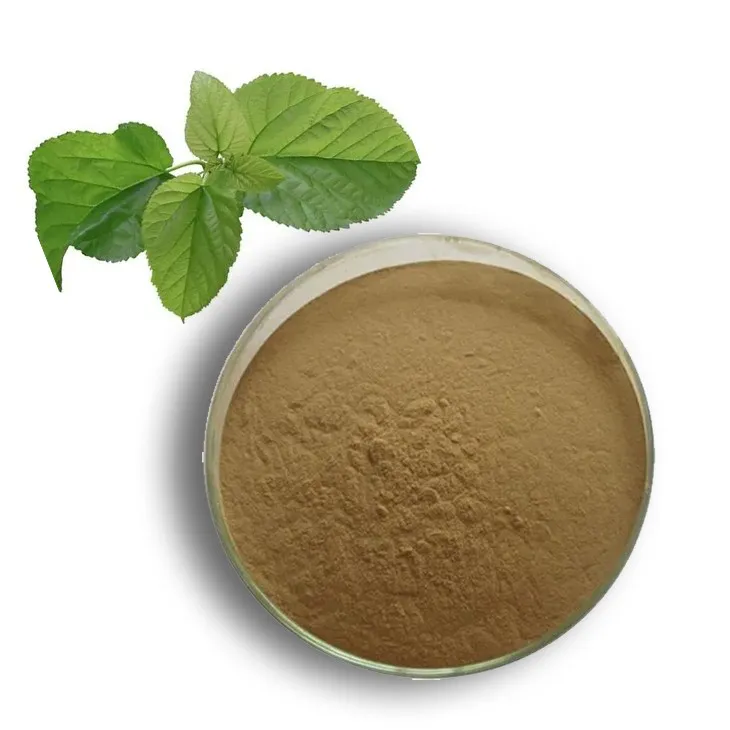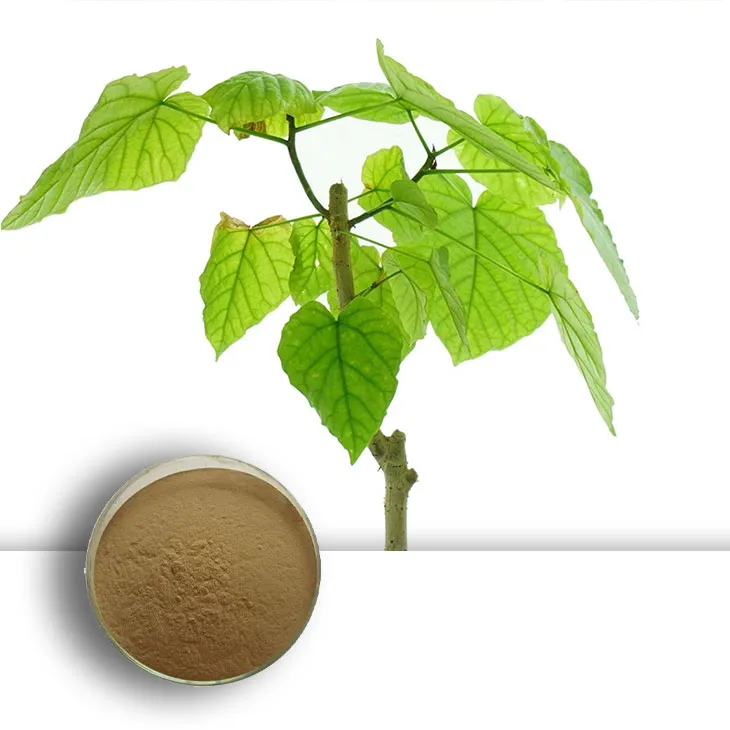- 0086-571-85302990
- sales@greenskybio.com
Benefits of Mulberry Leaf Extract in Cattle Feed.
2024-11-13

1. Introduction
In the field of cattle rearing, the search for effective and nutritious feed additives is an ongoing process. Mulberry leaf Extract has emerged as a promising candidate in recent years. It offers a range of benefits that can enhance the health, growth, and productivity of cattle. This article will explore the various advantages of incorporating Mulberry leaf Extract into cattle feed.

2. Nutritional Benefits
2.1 Amino Acids
Mulberry leaf Extract is a rich source of amino acids. Amino acids play a crucial role in the synthesis of bovine proteins. Cattle require a sufficient supply of amino acids for proper growth, muscle development, and overall physiological functions. For example, essential amino acids like lysine and methionine are necessary for building strong muscles and maintaining a healthy immune system in cattle. The presence of these amino acids in mulberry leaf extract helps to supplement the dietary requirements of cattle, especially when traditional feed sources may be lacking in certain amino acid profiles.
2.2 Vitamins and Minerals
In addition to amino acids, mulberry leaf extract also contains various vitamins and minerals. Vitamins such as vitamin C, which is important for collagen synthesis and antioxidant functions in the body of cattle. Minerals like calcium and phosphorus are essential for bone development and maintenance. The presence of these vitamins and minerals in the extract can contribute to a more balanced diet for cattle, reducing the risk of nutritional deficiencies and associated health problems.

3. Health Promotion
3.1 Gut Microbiota Modulation
One of the significant benefits of mulberry leaf extract in cattle feed is its ability to modulate the gut microbiota. The gut microbiota of cattle plays a vital role in their overall health. A balanced gut microbiota can improve digestion and nutrient absorption, as well as enhance the immune system. Mulberry leaf extract contains certain compounds that can promote the growth of beneficial bacteria in the gut while suppressing the growth of harmful ones. For instance, some phenolic compounds present in the extract have been shown to have prebiotic - like effects, which can lead to a more favorable gut microbial environment. This, in turn, can prevent the occurrence of digestive disorders and improve the general well - being of cattle.
3.2 Disease Prevention
By modulating the gut microbiota, mulberry leaf extract can also contribute to disease prevention in cattle. A healthy gut microbiota can act as a natural defense against pathogens. It can prevent the colonization of harmful bacteria in the gut, reducing the risk of diseases such as diarrhea and enteritis. Moreover, some components of the mulberry leaf extract may have direct antimicrobial properties, further enhancing the ability of cattle to resist infections. For example, certain flavonoids in the extract have been shown to inhibit the growth of some common bovine pathogens.

4. Palatability and Feed Intake
4.1 Phytochemicals and Palatability
The presence of certain phytochemicals in mulberry leaf extract can increase the palatability of feed. Cattle are more likely to consume feed that is appealing to their taste buds. Phytochemicals such as terpenoids and alkaloids in the extract can give the feed a unique flavor and aroma that cattle find attractive. This is especially important in situations where cattle may be picky eaters or when it is necessary to encourage them to consume more feed for optimal growth.
4.2 Improved Growth Performance
When cattle consume more feed due to the increased palatability, it can lead to better growth performance. Adequate feed intake is essential for cattle to reach their genetic potential for growth. With a higher consumption of feed supplemented with mulberry leaf extract, cattle can gain weight more efficiently, have better muscle development, and reach marketable weights sooner. This not only benefits the farmers in terms of increased productivity but also ensures the well - being of the cattle by providing them with sufficient nutrients for growth.
5. Environmental Considerations
5.1 Sustainable Feed Source
Mulberry trees are relatively easy to grow and require less intensive agricultural practices compared to some other feed crops. They can be grown in a variety of soil types and climates, making them a potentially sustainable feed source. Incorporating mulberry leaf extract into cattle feed can reduce the dependence on traditional feed sources that may have a higher environmental impact, such as those requiring large amounts of water or chemical fertilizers.
5.2 Reduced Methane Emission
There is some evidence to suggest that mulberry leaf extract can influence the rumen fermentation process in cattle, which may lead to a reduction in methane emissions. Methane is a potent greenhouse gas, and reducing its emission from cattle is an important environmental goal. While more research is needed in this area, the potential of mulberry leaf extract to contribute to methane reduction is an exciting prospect for sustainable cattle farming.
6. Economic Benefits
6.1 Cost - Effective Feed Additive
Mulberry leaf extract can be a cost - effective feed additive. The production of mulberry leaves can be relatively inexpensive, especially if grown on a large scale. Compared to some other specialized feed additives, mulberry leaf extract can provide similar or even better benefits at a lower cost. This can be beneficial for farmers, especially those with large herds, as it can help to reduce feed costs without sacrificing the quality of feed or the performance of the cattle.
6.2 Increased Market Value
Cattle that have been fed with mulberry leaf - supplemented feed may have improved meat quality. The enhanced growth performance, better health, and potentially more favorable nutrient composition of the meat can lead to a higher market value. Consumers are increasingly interested in meat products that come from healthy and well - managed animals. Therefore, using mulberry leaf extract in cattle feed can be a strategic move for farmers to increase the economic returns from their cattle farming operations.
7. Conclusion
In conclusion, mulberry leaf extract offers a wide range of benefits when included in cattle feed. From its nutritional value in providing amino acids, vitamins, and minerals, to its role in promoting health by modulating the gut microbiota and preventing diseases, and its positive impact on palatability and feed intake leading to improved growth performance. Additionally, it has environmental and economic advantages. However, further research is still needed to fully understand all aspects of its use in cattle feed, such as the optimal dosage and long - term effects. Nevertheless, the potential of mulberry leaf extract in the field of cattle rearing is promising and worthy of further exploration.
FAQ:
Q1: What are the main nutrients in mulberry leaf extract for cattle?
The main nutrients in mulberry leaf extract for cattle include amino acids. Amino acids are essential for the synthesis of bovine proteins, which play a crucial role in the growth and development of cattle.
Q2: How does mulberry leaf extract modulate the gut microbiota of cattle?
The exact mechanisms by which mulberry leaf extract modulates the gut microbiota of cattle are still under research. However, it is believed that certain components in the extract interact with the existing microbiota, promoting the growth of beneficial bacteria and suppressing the growth of harmful ones, thus achieving a balanced gut microbiota.
Q3: Can mulberry leaf extract completely replace other feed ingredients?
No, mulberry leaf extract cannot completely replace other feed ingredients. While it offers many benefits, cattle require a balanced diet that includes a variety of nutrients from different sources. Mulberry leaf extract should be considered as a supplement to enhance the overall nutritional value and health benefits of the feed.
Q4: How much mulberry leaf extract should be added to cattle feed?
The appropriate amount of mulberry leaf extract to be added to cattle feed depends on various factors such as the age, weight, and health condition of the cattle, as well as the composition of the rest of the feed. Generally, it is recommended to start with a small amount and gradually increase while closely monitoring the cattle's response and performance.
Q5: Are there any potential side effects of using mulberry leaf extract in cattle feed?
When used properly, there are no known major side effects of using mulberry leaf extract in cattle feed. However, if the extract is added in excessive amounts or if it is of poor quality, it may cause some digestive problems or imbalance in the cattle's system. Therefore, it is important to use high - quality extract and follow the recommended dosage.
Related literature
- The Role of Mulberry Leaf in Animal Nutrition"
- "Beneficial Effects of Mulberry Leaf Extract on Livestock Health"
- "Nutritional and Functional Properties of Mulberry Leaves for Cattle Feeding"
- ▶ Hesperidin
- ▶ Citrus Bioflavonoids
- ▶ Plant Extract
- ▶ lycopene
- ▶ Diosmin
- ▶ Grape seed extract
- ▶ Sea buckthorn Juice Powder
- ▶ Fruit Juice Powder
- ▶ Hops Extract
- ▶ Artichoke Extract
- ▶ Mushroom extract
- ▶ Astaxanthin
- ▶ Green Tea Extract
- ▶ Curcumin
- ▶ Horse Chestnut Extract
- ▶ Other Product
- ▶ Boswellia Serrata Extract
- ▶ Resveratrol
- ▶ Marigold Extract
- ▶ Grape Leaf Extract
- ▶ New Product
- ▶ Aminolevulinic acid
- ▶ Cranberry Extract
- ▶ Red Yeast Rice
- ▶ Red Wine Extract
-
Dandelion Root Extract
2024-11-13
-
Curcumin Extract
2024-11-13
-
Pine bark Extract Powder
2024-11-13
-
Phyllanthus Emblica Extract
2024-11-13
-
Lily extract
2024-11-13
-
Coix Seed Extract
2024-11-13
-
Calendula Extract
2024-11-13
-
Nutmeg Extract
2024-11-13
-
Licorice Root Extract Powder
2024-11-13
-
Sea buckthorn Juice Powder
2024-11-13





















